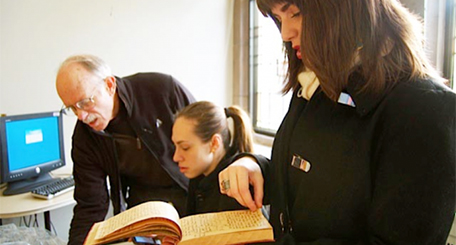
When Professor Walter G. Andrews first arrived at the University of Washington in 1969, he embarked on a journey to encourage undergraduates and graduate students to embrace the niche area of study that has been shaped by his wide-ranging contributions. With his doctoral degree in Turkish Language and Literature from the University of Michigan, Ann Arbor, Professor Andrews paved the way for the creation of the Ottoman and Turkish Studies Program in the Department Near Eastern Languages and Civilizations (NELC), to broaden awareness of the field he was so passionate about.1
With his zeal for education combined with his experience in the field of Ottoman texts, in 1986 Professor Andrews partnered with Professor Mehmed Çavuşoğlu, a leading scholar at the Mimar Sinan University in Istanbul, to bring his enthusiasm to a wider audience. Out of this collaboration the Ottoman Text Archive Project (OTAP) was born, and with resounding success.2 As Professor Andrew’s interest in bringing Ottoman Texts to students grew, in collaboration with Dr. Stacy Waters, Dr. Mary E. Childs and Dr. Sarah Ketchley, he founded Newbook Digital Texts in 2012.3 A publishing house focused on the humanities, the founding researchers took upon the legacy of OTAP that included digital humanities, and each used their own historical interests in the creation of various projects. Bringing together undergraduate and graduate interns and scholars from across the globe, Professor Andrews created a ground for the expansion of Turkish and Ottoman Studies.

Over the 40 years of Professor Andrews’ influence at the University of Washington and the field of Ottoman texts and digital humanities research, he has received various accolades, including mentoring awards from the Middle Eastern Studies Association4 and the University of Washington for Undergraduate Research5, demonstrating the breadth of his influence not only in the field itself, but on individuals. Professor Andrews also received an Order of Merit of the Republic of Turkey in 2016, and in the same year a Long Time Service Award from the Turkish American Cultural Association6. More recently American Association for Teachers of Turkic Languages named their Ottoman Turkish Translation Award after him7. However, the impact that Walter had on individuals was often closest to his heart, and the success of the various projects he began under OTAP and Newbook would not be possible without his mentorship and his dedication to his interns and colleagues.
- Kuru, Selim S. “Walter G. Andrews (1939-2020).” Near Eastern Languages & Civilization, University of Washington, 1 June 2020.
- Andrews, Walter G. “OTAP Project History.” OTAP.
- “About.” Newbook Digital Texts, www.newbookdigitaltexts.org/about/.
- “MESA Mentoring Award – Walter G. Andrews.” Middle East Studies Association, 16 Mar. 2018.
- “Past Research Mentor Awardees.” Undergraduate Research Program, University of Washington, 2018.
- Kuru, Selim S. “Walter G. Andrews (1939-2020).” Near Eastern Languages & Civilization, University of Washington, 1 June 2020.
- “American Association for Turkic Teachers Names Award After Prof. Walter G. Andrews.” Near Eastern Languages and Civilization, University of Washington, 15 Oct. 2020, 10:45am.